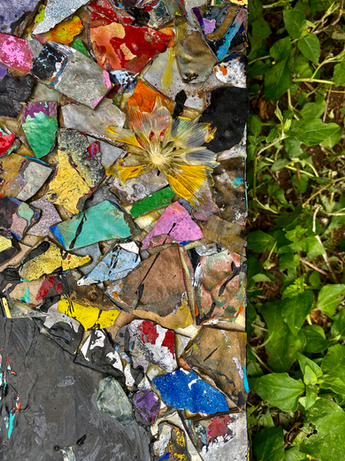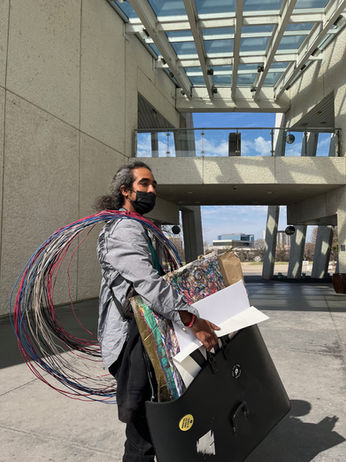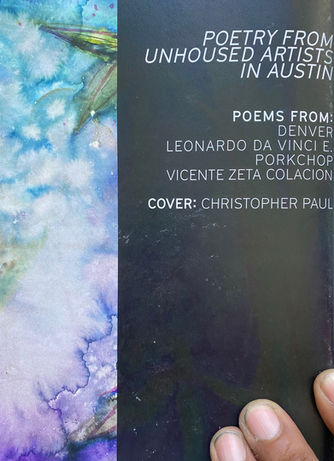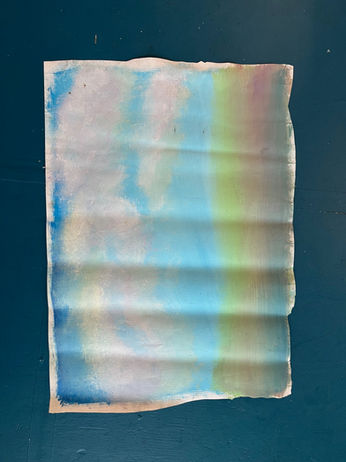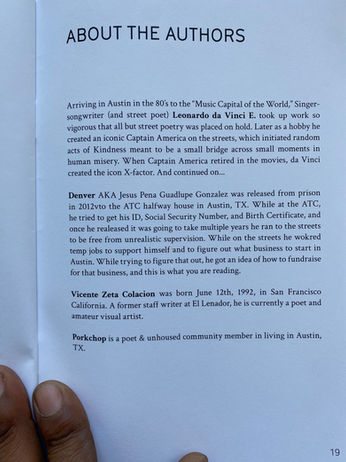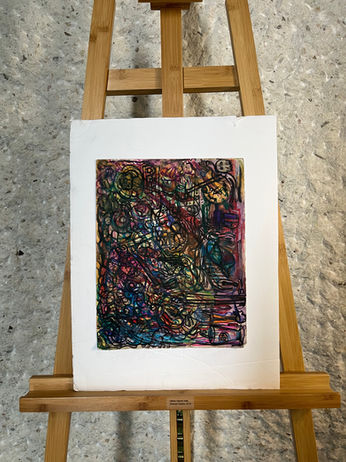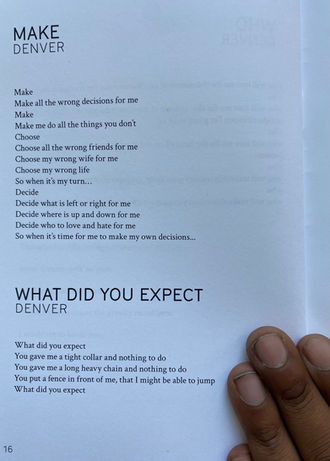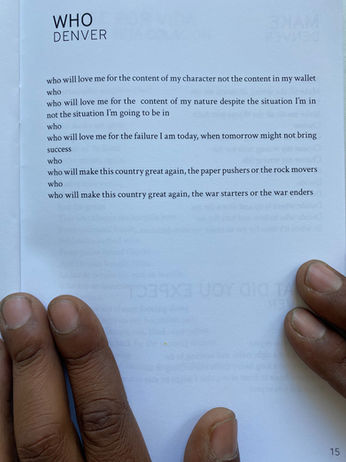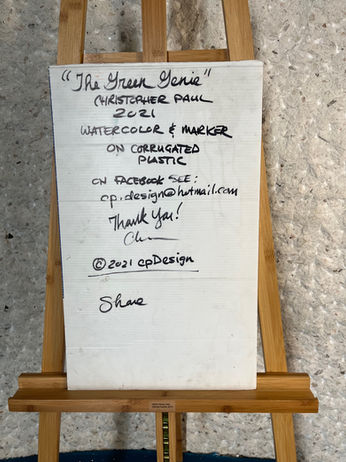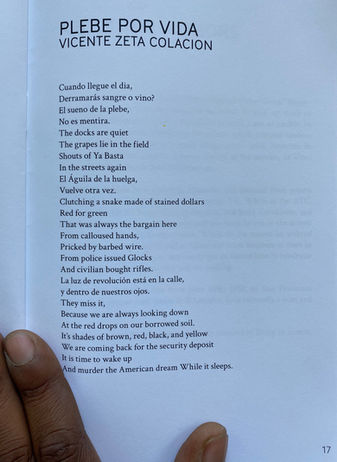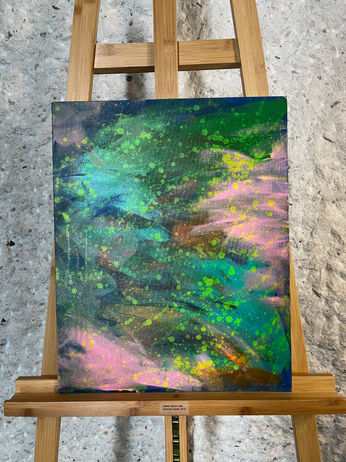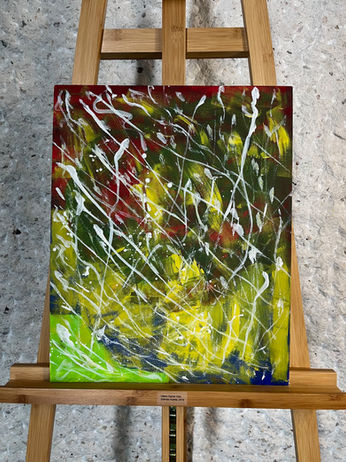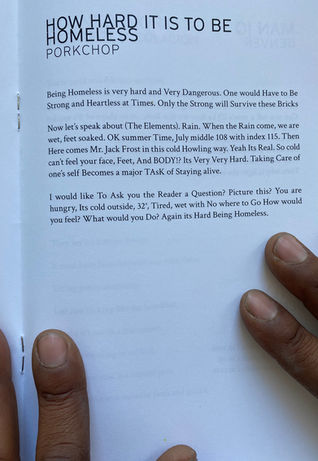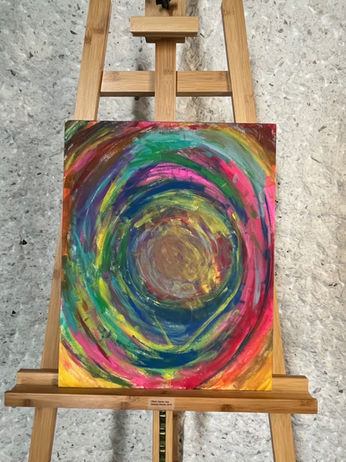

urban echo

abouT
Welcome to Urban Echo, a print and online newspaper inspired by the unsung, unhoused heroes of Austin. Infamously known as Bat City, both Austin’s bats and humans are the two mammals living under Downtown bridges. As Denver Gonzales says, "To understand the health of our ecosystem, we must listen to The Urban Echo." Our name reflects this connection, just as bats use echolocation to navigate, we amplify the diverse voices and stories that shape our city.
Urban Echo Magazine features contributions from ten artists per edition, including interviews, essays, poetry, prose, and street photography. We focus on conversations over cancel culture, covering topics like:
-
Stories of survival and mental health.
-
The resilience required to keep showing up in life.
-
The business of prisons and hospitals and how the unhoused community is directly affected by both.
-
Discussing the slippery slope of homeless profiteering.
-
Rehumanizing individuals stereotyped as “stranger danger” in your backyard.
Urban Echo supports initiatives such as Draw Together art classes at homeless encampments and offers Artists in Residency programs at the ESB-MACC, Carver Museum, and Daugherty Arts Center.
Join us in creating a platform that echoes Austin's streets and fosters understanding and community action. Together, let's amplify the Urban Echo.


unifY
We are already divided.
We need to find ways to return to ourselves and each other. I'm an activist focused on calling people in, into dialogue, into community, and into liberation.

inform
When people have access to information, they have a choice. I'm a journalist who centers stories from survivors. We have so much to learn from and with each other. Our challenges both mental, physical, and spiritual reveal the beauty in our beasts.

beauTifY
We challenge stigmas of street artists by creating accessible art events outdoors. People assume all unhoused citizens are the same. We are not. I treasure the weird of Austin and I'm here to leave whatever I touch better off than when I found it.


denVer

Hi, my name is Denver.
I don't paint pretty pictures. I paint the pretty ugly truth.
I tell the truth because you are your own worst person you can lie to.
Here's my true story; am always changing, and I am the work of art.
Born in Matamoros, Tamaulipas México, I remember the last time I saw my mom was crossing the river a child. On the other side, I was put into foster care with a family in The Valley. Seizures were common for me and I was often overstimulated walking in the street so I often looked down to cope. That gave me an idea. What if I could make murals not on walls, but on sidewalks for other kids like me who walk around looking down. What if they could see themselves as superheros in their own story unfolding at their feet? Surviving taught me to incorporate my surroundings into my creativity.
Trees are an inspiration to me. Plants survive because they constantly do math. They have 21 senses while we have five. You'll find me on a hike, in a hammock, or making wire bonsai sculptures marveling at nature. I began this ritual of creating trees to grieve and honor the memory of my friends who died in the streets during the 2021 Iceapocalypse.
I changed my name to Denver while living there studying to become an engineer. School debt sent me to the streets and I was chronically unhoused from 2009 until August 2021. I learned so many skills from the people I met, hydroponic systems, soaps, ponchos, rosaries, baby shoes, picture frames, roses out of toilet paper, and even how to strip speakers and magnetize them into tattoo guns. Boredom births creativity.
Creativity sustains survival.
In 2016, I camped under the 30' XYZ Atlas Sculpture on South Congress. in 2021 I joined the XYZ Atlas team to lead Draw Together art events and make my own handcrafted sculptures. I've learned to leave my art scattered like seeds around the city. You might find my art on the bus, in a theater, camp, park, street, prison, or City Hall.
I prefer to work with imperfect people who aren't ashamed because honesty builds trust.
Remember plants. Compost shit. Shit grows.
What's the difference between art and contraband? It is how you see.
I see Art healing.
I see Art re-building trust.
I see Art imagining new futures.
I see Art survive and thrive by simply being alive.
Can you see your story as an art all of its own?


arTicles

AUSTIN CHRONICLE By Kit O’Connell, Fri., Feb. 25, 2022
"Everything costs more being homeless," said Jesus Guadalupe Peña Gonzalez, who goes by "Denver" on the streets. For example, "you can't go to the H-E-B to buy groceries, you have to go to fast food or a food truck and that food is more expensive." Denver explained that many people he meets on the streets are orphans like him who came out of the foster system without a good support network.
"A lot of individuals have done time [in prison] so that's years that they haven't made money, that they haven't been spending money, so they have fallen behind ... they do need help," he said. People return again and again to the illegal camps, only to be kicked out again. Thanks to Austin's rapid development, many of the hidden places where people used to camp are no longer available. "They're pretty much going in circles," Denver said.
Even when they take the first steps to get off the streets, it can still take months or years to get there. Denver arrived on the streets of Austin in 2012 and applied for a housing voucher in 2014. It took him until late last year to get approved and arrange everything so he could move into his studio apartment. When the Chronicle interviewed him in January, Denver said he was still settling in and getting used to sleeping indoors again...
According to Denver, laws which ban camping or sleeping essentially punish residents for making mistakes. People come to Austin for all kinds of reasons – like looking for work or starting a business – and some of them end up unhoused when those efforts fall through. "People are going to continue to take risks," he said, "and sometimes the result of their risks is they end up homeless. That doesn't mean we need to make it illegal for them to fail."
He added, "You've got to support them as they get back on their way because that's what we really need, is a little support while we get back on our feet." He's equally insightful about potential solutions. "I'd like to design the next homeless shelter," he said.
One innovation he suggested was putting numerous smaller shelters and transitional housing throughout the city's neighborhoods, instead of centralizing everyone at just a few massive shelters and housing projects. This would allow them to stay closer to their friends, families, and other support networks. While the city's new bridge shelters are located in former motels, the need for better emergency shelters to escape both cold and heat, perhaps for days or weeks, is one of the forces driving the development of "resilience hubs" after Uri. These will likely find homes in existing neighborhood-serving facilities like schools, libraries, and recreation centers.
As poverty increases nationwide, Austin has good company in its struggles with a growing population of the poor. Many of them are slipping through the cracks when it comes to official options for support. Listening more to the people actually affected by this crisis, and not just to those who find it upsetting, might lead the community to new solutions that can leverage existing organizing efforts – be it mutual aid or the dedicated Verde-blooded fans of Austin FC – that bring us all closer together as a community.
*photo of Denver Gonzalez and Tony Noble by Camille Wheeler (IG @Camillewheels)









